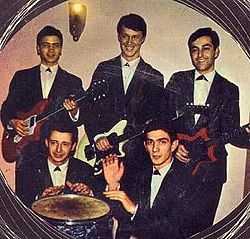Iskre
| Iskre | |
|---|---|
 | |
| Background information | |
| Origin | Belgrade, SR Serbia, SFR Yugoslavia |
| Genres | Beat music, rock, instrumental rock |
| Years active | 1961 – 1966 |
| Labels | Diskos |
| Associated acts | Siluete, Dah, Rokeri s Moravu |
| Past members |
Slavoljub Bogdanović Miloš Sekulić Gligorije Milanović Draško Reljin Branislav Nikolić Dragan Mirković Branko Gluščević |
Iskre (Serbian Cyrillic: Искре, trans. The Sparks) was a former Yugoslav rock band. The band is notable for being one of the pioneers of the former Yugoslav rock scene.
History
The band was formed in 1961 by the students of Belgrade's Second Gymnasium: Slavoljub Bogdanović (rhythm guitar), Miloš Sekulić (guitar), Gligorije Milanović (bass guitar), and Draško Reljin (drums). The band choose their name after Iskra amplifiers (originally designed for movie theaters) they used at the beginning of their career. The band started their career by playing instrumentals inspired by the music of The Tornados, Johnny and the Hurricanes, The Champs, The Coasters, The Drifters, Santo & Johnny, and soon achieved notable popularity.
At the 1962 May Youth Festival, held at Belgrade's Dom Sindikata, they won the first place, and at this time they were joined by Branislav "Beka" Nikolić (organ, a former 3+1 member). The band often performed at pop concerts and dances and appeared on Radio Belgrade. Iskre were one of the first Yugoslav bands that appeared on recordings by pop music singers: they recorded with Zafir Hadžimanov (covers of Cliff Richard songs), Ivanka Pavlović, Zoran Rambosek, and others. During 1963 Iskre often performed with female vocalist Brankica Sučević (an official member of Safiri). The band wanted to record their debut EP with her, but the editors of Diskos record label insisted that the band record the EP with the then-popular female singer Ivanka Pavlović. The EP with songs "Mala Šeila", "Locomotion", "Peppermint Twist", and "Slušaj pesmu" was eventually released under Ivanka Pavlović's name only. The EP soon became the second best-selling Yugoslav pop music record (behind Nikola Karović's "Mala Grkinja"). After the recording of the EP Milanović left the band, and was replaced by a former Duet M member Dragan Mirković. In January 1964 the band won the first place at the Parada ritma festival held at Dom sindikata. Several months later they held their first solo concert at Kolarac People's University, and soon after released their official debut EP, with songs "Stalaktit" (a cover of a Les Aiglons song), "Šeba", "Rock za dobro jutro" and "Zvončići". After the release of the EP Mirković left the band, and was replaced by a former Siluete and Lutalice member Branko Gluščević.
During 1965 they recorded two EPs, both featuring four songs, three of them being instrumental tracks. They appeared in Toma Janjić's film Glasam za ljubav, becoming the first Yugoslav rock band to appear on film. At this time the band's popularity declined, due to the popularity of new rock genres. The band started covering Macedonian traditional songs, but did not see expected success. During January and February 1966 they performed at Belgrade Gitarijada (not to be confused with Zaječar Gitarijada) where they won the fifth place. Soon after they disbanded.
Post breakup
Gluščević continued his career in bands Dah and Rokeri s Moravu. Mirković played in Nena Ivošević's backing orchestra, and during the 1990s he was the president of the Association of Jazz and Popular Music Artists of Yugoslavia.
Discography
EPs
- Stalaktit (1964)
- Tequila (1965)
- Bossa nova (1965)
References
- EX YU ROCK enciklopedija 1960-2006, Janjatović Petar; ISBN 978-86-905317-1-4
| ||||||||||||||||||
| ||||||||||||||||||